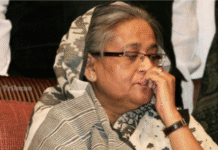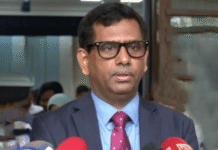
We are disappointed to find that although the Dhaka University authorities recently spoke of their decision to get rid of Gono Rooms at their dormitories, first-year students have been forced to cram into such rooms after the full reopening of residential halls. Only last month, we expressed our doubt about the university’s ability to end this Gono Room culture, given that these rooms are mostly occupied by former students who are involved with the ruling party’s student wing.
Reports suggest that the authorities had even prepared lists of former students staying in the dorms illegally, and of first- and second-year students to whom these seats would be allotted. While these preparations are commendable, it is apparent that the implementation has been less than desirable. On Sunday night, around 30 to 35 students had to sleep on the floor of each Gono Room, which is supposed to accommodate only eight students. The political use of “guest rooms” has also returned. According to a report in this daily, first-year students were forced to attend gatherings in the guest rooms of certain dormitories on the same night.
University students have been deprived of in-person classes throughout almost the entirety of the Covid-19 pandemic due to fears of the disease spreading. Now that they have finally returned to their campuses, it is extremely troubling that they are being forced together into spaces where physical distancing is impossible—that, too, because of political reasons, rather than an accommodation crisis. The repercussions of such actions could be serious, at a time when the Covid-19 situation finally seems under control in the country.
Prior to the pandemic, the dormitories did not allot seats to first-year students, who had to seek the patronage of Chhatra League men to cram into Gono Rooms in exchange for attending political processions and meetings. This highly toxic practice has been criticised by the prime minister herself, according to the DU vice-chancellor, who sought help from all students to end this culture. However, the cooperation he has asked for must come, first and foremost, from Chhatra League. Although the DU Chhatra League general secretary seemed to agree on the importance of physical distancing, his outright denial of all other allegations against the organisation is not conducive for change.
We urge the ruling party to investigate this matter, and rein in its student wing and their political influence over university campuses. The university students urgently need a safe and enabling environment to recover from learning losses. Campuses that are occupied by former students, and where rules do not seem to apply to certain sections of its inhabitants, will only hamper their progress.


 For all latest news, follow The Daily Star’s Google News channel.
For all latest news, follow The Daily Star’s Google News channel. 







